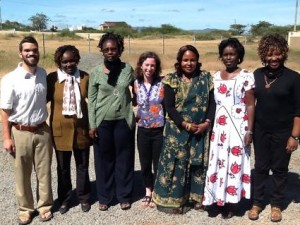
Rosh Hodesh and Shevet Achim group leaders at Temple Beth Avodah in Newton Centre and Temple Aliyah in Needham respectively, both near Boston.
Originally from the Boston area and married since 2010, new Rosh Hodesh: It’s a Girl Thing! and Shevet Achim: The Brotherhood group leaders Anya Manning and Elie Lehmann spent the past year working with grassroots women’s organizations on the Thailand/Burma border and in Kenya. Three days after returning from Kenya, they attended the Moving Traditions’ National Training Conference in Boston to prepare to lead Rosh Hodesh and Shevet Achim groups .
Why were you interested in becoming a group leader?
Anya: I have over a decade of experience tutoring Bar and Bat Mitzvah students. The opportunity to run a Rosh Hodesh group speaks to my love and passion for working with teens who are journeying through a really formative and vulnerable stage of life and lets me draw on my experience gained this past year working with women and girls’ rights organizations. I am passionate about the value of a cohort experience, mentorship, and learning from each other and feel this is a great way to combine all of those interests.
Elie: I was interested because I think that it’s an important age Jewishly and in terms of personal growth. In those years after bar mitzvah there is more independence in claiming the connection to Judaism and Torah. I like to help them find that access point to Judaism and use that to help them figure out how to become men. The program provides them with tools that they wouldn’t normally find within society.
Was there anything at training that inspired or surprised you?
It was fantastic to meet other Rosh Hodesh: It’s a Girl Thing and Shevet Achim: The Brotherhood facilitators from around the country. While we were learning how to create a cohort of girls in our local community we were also creating a cohort of facilitators that we can go to for questions, advice, and support over the course of the year.
Elie: the variety of educators, the age range was inspiring and educational. It’s not just the young people that want to do this, but there’s something that all generations of Jewish men are interested in helping young people become young Jewish adults.
You came to training only three days after returning from a year in Kenya and Asia, what inspired you to take this far flung journey abroad?
Anya: It had been a dream of ours for a long time and we reached a point in our lives where we said, “If not now, when?” Things were going great but we thought that if we wanted to take the time to travel, volunteer, encounter other cultures, share some of our skills, and learn more, now was the time.
What skills did you share with the women you met?
Anya: On the Burma/Thailand border, I worked with women health professionals who took care of their entire ethnic group. I gave them training on reproductive health, program design, logic models, proposal writing, and excel to help them manage budgets.
Elie: I had 10 students between ages of 18-23 and I taught them English, democracy studies, environmental studies, and conflict resolution. My students will go back to their communities as leaders and help bridge the gap between youth and adults in their communities.
What about in Kenya?
Anya: The organization I worked for educated Masai women and girls on their rights. We additionally taught them job readiness and life skills. The ability of girls to finish high school is critical as it alleviates some of the most harmful practices they face such as early marriage and genital mutilation.
Elie: I helped them with social networking and their website.
Is there anything from your own experiences that will help inform your interactions with your Rosh Hodesh group?
Anya: I plan to encourage the girls to see themselves as part of a larger world. I hope to inspire them to become global citizens without leaving their neighborhood and see themselves connected to people like the girls I met in Burma who don’t have access to a proper education.
Elie: When we say what it is to be a man, they should realize how relative that statement is. In our travels this year we saw lots of different ideas and ways of being a man. In Burma, the men all wear long skirts, which would be non-masculine in our country. So seeing a variety of expressions of masculinity will help to work with these teens. All expressions of manhood are equally viable and authentic.
